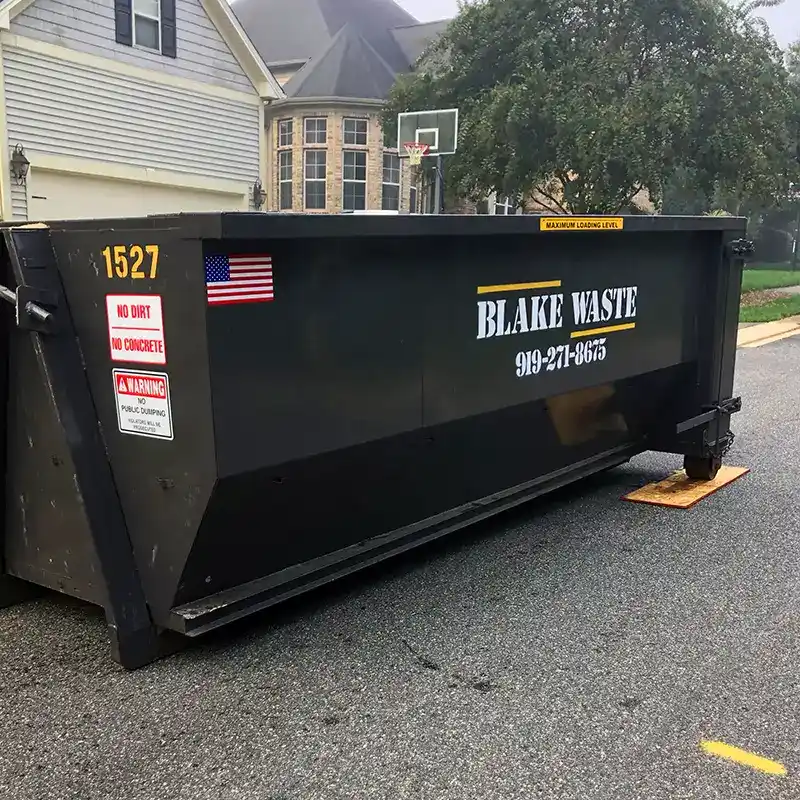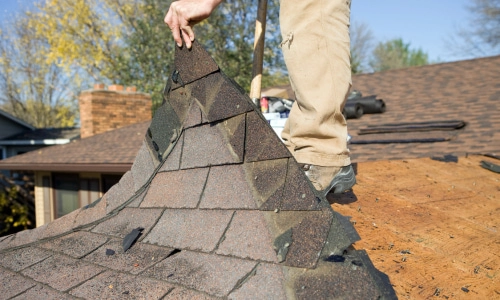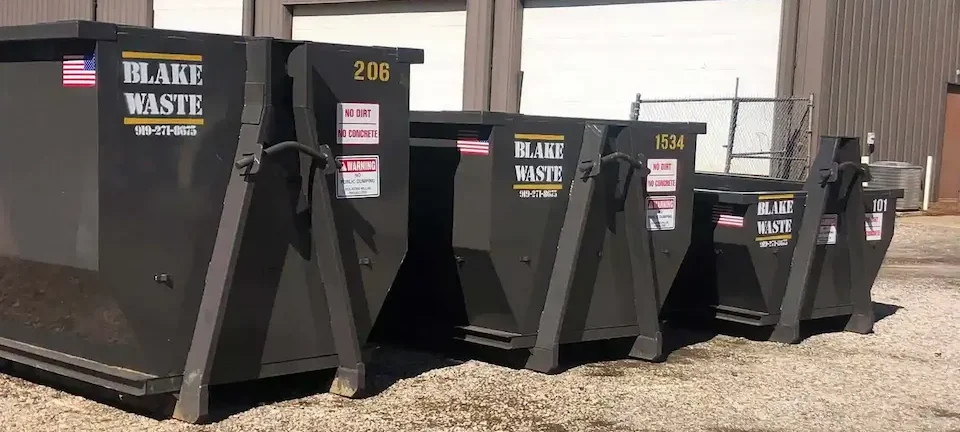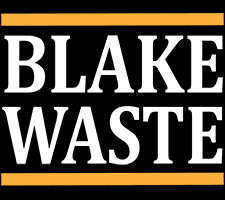Among the various components of a roof, shingles play a crucial role in providing protection, insulation, and aesthetic appeal. Understanding the weight of these roofing materials is essential for both professionals and homeowners alike for a variety of reasons. Whether you are planning your next roofing project or looking for a Wake Forest area construction dumpster rental to dispose of removed shingles, our experts have everything you need to know.

Understanding the Weight of Shingle Bundles
Understanding how much roofing shingles weigh is an important aspect of any roofing project. Shingle bundles refer to the packaged units of shingles that are used to cover roofs. These bundles contain multiple individual shingles and are designed to be conveniently transported and installed.
Roofing Square vs Bundle of Shingles
A roofing square is a measurement unit used in the roofing industry to quantify the area of a roof. It represents a 10-foot by 10-foot (100 square feet) section of the roof's surface. A roofing square is the standard unit for estimating the amount of shingles needed to cover a roof.
In contrast, a bundle of shingles refers to the packaging of shingles for sale and distribution. It contains a specific number of individual shingles that are typically bundled together using plastic or paper wrapping. The number of shingles in a bundle can vary depending on the manufacturer and the type of shingle being sold.
Average Weight of a Bundle of Shingles
Identifying what a bundle of shingles weighs can vary based on several factors, including the type of shingle, the material used, and the manufacturer. However, the average weight of a bundle of shingles typically falls within a certain range.
Asphalt shingles usually weigh between 50 to 80 pounds per bundle. These bundles typically contain around 25 to 40 individual shingles. Other types of shingles, such as wood shingles or metal shingles, may have different weights. For example, wood shingle bundles can weigh around 40 to 80 pounds on average, while metal shingle bundles can range from 30 to 60 pounds.
Factors that Affect the Weight of Shingle Bundles
When considering the weight of a bundle of shingles for a roofing project, several factors come into play.
Here are some key factors that affect the weight of shingle bundles:
- Type of Shingles: Different types of shingles have varying weights. The materials used, such as asphalt, wood, metal, or slate, contribute to the overall weight of the shingles.
- Roofing Square Area: The size of the roof, measured in roofing squares, directly affects the total weight of shingles needed. A larger roof area will require more shingles and, subsequently, increase the overall weight needed to complete the project.
- Shingle Thickness: The thickness of shingles can vary, and thicker shingles generally weigh more than thinner ones. Thicker shingles may offer additional durability and longevity but can also add to the weight load on the roof.
Architectural Shingles, Asphalt Shingles, and Slate Shingles Weight
Different types of shingles have varying weights due to the materials used in their construction.
Here is a general overview of the weight ranges for three common types of shingles:
- Architectural Shingles: Architectural shingles, also known as laminated or dimensional shingles, are thicker and have a textured appearance. They typically weigh between 70 to 110 pounds per roofing square.
- Asphalt Shingles: Asphalt shingles are the most commonly used shingles for residential roofs. They are lightweight and affordable. The weight of asphalt shingles typically falls within the range of 50 to 80 pounds per bundle, with each bundle covering approximately 1/3 of a roofing square.
- Slate Shingles: Slate shingles are natural stone shingles known for their durability and aesthetic appeal. They are significantly heavier compared to other shingle types. Slate shingles can weigh between 800 to 1,500 pounds per roofing square, depending on their thickness and size.
Calculating the Total Weight for a Roofing Project
To calculate the total weight of shingles needed for a roofing project, several factors need to be considered.
Here is a general approach to estimating the weight:
- Determine the area of the roof in roofing squares: Measure the length and width of each roof section and multiply them to obtain the total square footage. Divide the result by 100 to get the number of roofing squares.
- Identify the type of shingles to be used: Consult the manufacturer's specifications or packaging to determine the weight per bundle or per roofing square.
- Multiply the number of roofing squares: Multiple roofing square weight by the weight per square or the weight per bundle to obtain the total weight of the shingles.
- Consider the additional weight of underlayment, insulation, and other roofing layers: Refer to the product specifications for the weight per square foot or per roofing square and calculate the total weight accordingly.
- Sum up the weights: Add the weights of the shingles and additional layers to determine the total weight of the roofing project.
Calculating the total weight of your roofing project helps ensure that the roof's load-bearing capacity is not exceeded and allows for proper planning, material procurement, and installation considerations.

Importance of Proper Waste Management During Roofing Projects
Effective waste management practices play a significant role in maintaining a clean and safe work environment, minimizing environmental impact, complying with regulations, and promoting sustainability.
Environmental Protection
Roofing projects generate a substantial amount of waste materials, including old shingles, nails, packaging materials, and debris. Improper disposal of these materials can have negative environmental consequences.
Health and Safety
A cluttered and disorganized work environment can pose safety hazards for workers and others on the job site. Loose debris, sharp objects, and tripping hazards increase the risk of accidents and injuries. Proper waste management involves promptly removing waste materials, keeping the work area clean, and organizing waste in designated containers or dumpsters.
Compliance with Regulations
Many regions have specific regulations and guidelines regarding waste management and disposal. Proper waste management ensures compliance with local, state, and federal regulations, including proper handling and disposal of hazardous materials, if applicable.
Resource Conservation
Materials such as old shingles, metal, and wood can often be recycled or repurposed rather than ending up in landfills. By diverting waste from landfills and promoting recycling, the consumption of raw materials can be reduced, leading to more sustainable roofing practices.
Cost Efficiency
Proper sorting, recycling, and reuse of materials can reduce waste disposal costs. Additionally, recycling materials such as metal or asphalt shingles may provide opportunities for cost savings or even generate revenue through recycling programs.
Dumpster Rental for Roofing Shingles
When replacing or repairing a roof, a significant amount of debris is generated, including old or damaged shingles, nails, and other roofing materials. A dumpster rental in Raleigh allows for efficient and convenient disposal of this waste.
Assess Your Needs
Determine the size of the dumpster you require based on the volume of roofing shingles you expect to remove. It's essential to estimate the volume of shingles accurately to avoid renting a container that's too small or unnecessarily large.
Find a Dumpster Rental Service
Look for a reputable local waste management company or dumpster rental service that provides containers suitable for roofing debris. You can search online, check directories, or ask for recommendations from contractors or other homeowners who have recently undergone a roofing project.
Contact Our Dumpster Rental Experts
When you reach out to Blake Waste for dumpster rentals in Wake Forest, we will guide you through the process, answer any questions, and assist you in selecting the right dumpster size for your needs.
Dumpster Delivery and Placement
Once you've finalized your dumpster rental agreement, we will schedule the delivery of the dumpster to your property. Make sure to specify a suitable location for the dumpster, preferably on a flat surface near the area where the shingles will be removed.
Proper Use and Loading
Load the dumpster with roofing shingles and associated debris, while avoiding overloading it or placing prohibited items such as hazardous materials or large objects. Place the shingles and other waste material into the dumpster as you remove them from the roof.
Dumpster Removal
Once you've completed your roofing project or the rental duration has ended, simply contact us to schedule the removal of the dumpster. We will send a truck to pick up your rental container and properly dispose of its contents.

Factors to Consider When Renting a Dumpster for Roof Shingles
Renting a dumpster is a practical solution for managing waste during a roofing project, particularly when it involves shingle removal. However, several factors need to be considered to ensure you choose the right dumpster size that meets your needs and adheres to local regulations.
Size of the Dumpster
The size dumpster you choose should accommodate the amount of shingle waste you expect to generate during the project. It's better to err on the side of caution and choose a slightly larger size waste container if you're uncertain about the quantity of waste. This ensures you have enough space to dispose of all the shingles without overfilling the dumpster.
Permit and Placement
Some areas require permits for placing dumpsters on public property or streets. Check with your local municipality to determine if a permit is necessary and how to obtain it. Additionally, consider the logistics of dumpster placement on your property. Ensure there is enough space for the dumpster, and it won't obstruct driveways, walkways, or other essential areas.
Weight Restrictions and Disposal Options
Dumpsters have weight restrictions that dictate the maximum weight they can hold. Since shingles can be heavy, particularly if you're using materials like slate or metal, it's important to choose a dumpster that can handle the weight.
Rental Duration
Ensure that the rental period for your residential or commercial dumpster aligns with the project timeline, allowing sufficient time for shingle removal and waste management. If you anticipate a longer project, discuss flexible rental options with our waste removal experts at Blake Waste. Extending the rental period can help avoid rush fees or renting a new dumpster if the project takes longer than expected.
Starting A Roof Replacement? Trust Your Roofing Waste with the Experts at Blake Waste
Are you gearing up for a roof replacement project? Don't let the hassle of roofing waste management or shingle weight overwhelm you. Trust your roofing waste with the experts at Blake Waste and experience a seamless and stress-free waste disposal process, all while receiving answers to your questions about dumpster rental services in Wake Forest.
Contact us today at 919-271-8675 or fill out our contact form below to get started.

